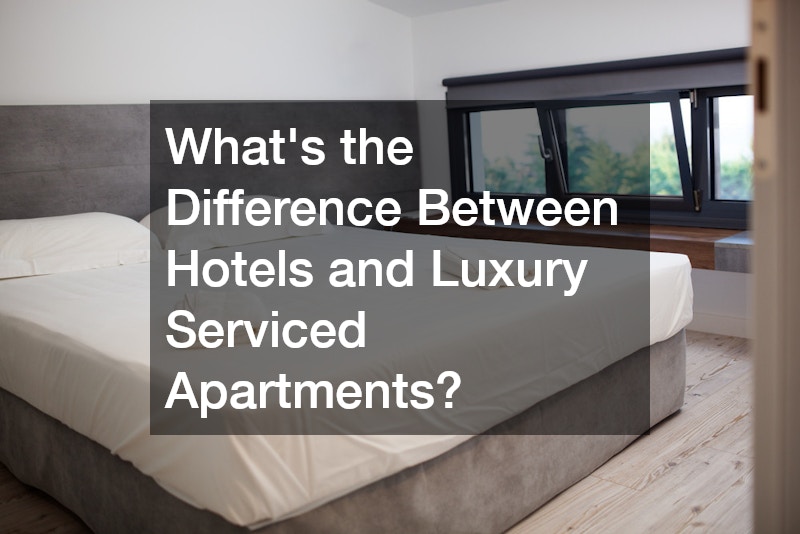Disclaimer: Best Travel Videos. This site provides travel content for informational purposes only.
When it comes to accommodation, travelers have a variety of options depending on their needs, preferences, and the length of their stay. Two popular choices are hotels and luxury serviced apartments. While both offer comfort and convenience, they cater to different types of guests and provide distinct experiences. To help clarify these differences, let’s compare the key aspects of hotels and luxury serviced apartments, examining what sets them apart in terms of amenities, flexibility, and overall experience.
1. Space and Layout
One of the most significant differences between hotels and luxury serviced apartments is the amount of space and the layout of the rooms.
Hotels: Hotel rooms are typically smaller and designed for short stays. Most hotels offer standard room layouts, with a bed, a bathroom, and basic furniture. While upscale hotels may offer more spacious rooms or suites, the design remains focused on providing a comfortable sleeping and resting space. Rooms in hotels generally lack separate areas for working or dining, and the layout is usually optimized for transient stays.
Luxury Serviced Apartments: In contrast, luxury serviced apartments offer far more space, often with separate areas for living, working, dining, and sleeping. These apartments are designed to offer the same level of comfort as a home, with fully furnished living rooms, kitchenettes or full kitchens, and sometimes even additional amenities such as balconies or private gardens. The apartments are spacious enough to accommodate families, long-term stays, or individuals who need a comfortable environment to live and work in.
2. Kitchen and Dining Facilities
Another key distinction between hotels and luxury serviced apartments is the level of self-sufficiency provided in terms of food and dining.
Hotels: Hotel rooms generally include a basic refrigerator and sometimes a minibar, but they rarely offer full kitchen facilities. Dining options at hotels usually revolve around on-site restaurants, room service, or buffet breakfast. While some hotels offer kitchenettes in higher-end rooms or suites, they are often limited in their range of appliances and cooking equipment.
Luxury Serviced Apartments: Luxury serviced apartments, on the other hand, are equipped with fully functional kitchens, including a stove, oven, microwave, refrigerator, and often a dishwasher. Kitchenware, such as pots, pans, utensils, and dishes, are typically included as well, allowing guests to cook their own meals and have a more home-like experience. For guests staying for extended periods, the ability to cook for themselves adds a significant level of convenience and cost savings, especially for those on long-term business trips or family vacations.
3. Services and Amenities
The services and amenities offered by hotels and luxury serviced apartments also differ, with each type of accommodation providing a distinct set of benefits.
Hotels: Hotels offer a variety of services depending on their star rating, but the most common amenities include daily housekeeping, concierge service, room service, and access to facilities such as fitness centers, swimming pools, and restaurants. High-end hotels may also offer spa services, valet parking, and business centers. However, the focus in hotels is on convenience and luxury for short-term guests, with services tailored to meet the immediate needs of travelers.
Luxury Serviced Apartments: Luxury serviced apartments provide many of the same services as hotels, such as housekeeping, concierge, and 24-hour security, but with a few notable differences. The housekeeping in serviced apartments may be less frequent (usually weekly or bi-weekly), as guests tend to stay longer. Additionally, serviced apartments offer the convenience of a home-like experience with laundry facilities either within the apartment or on-site. Some serviced apartments may offer additional perks such as access to fitness centers, pools, or business centers, similar to hotels. However, the services are more focused on creating a comfortable, self-sufficient environment for guests staying for extended periods.
4. Flexibility and Length of Stay
The flexibility of stay is one of the main reasons travelers opt for serviced apartments over hotels, especially for longer stays.
Hotels: Hotels are primarily designed for short-term stays, typically ranging from a few days to a week. While many hotels allow guests to extend their stay, the accommodations are generally not designed for long-term use. Hotels may also require daily check-ins and check-outs, which can feel more transactional and less personalized for extended stays.
Luxury Serviced Apartments: Luxury serviced apartments, in contrast, are specifically designed to accommodate long-term stays. The minimum stay requirement is often much more flexible, with many serviced apartments available for stays as short as a few nights or as long as several months. They offer the convenience of home with the added benefit of hotel-style services, making them ideal for business professionals on assignments, relocating families, or anyone in need of temporary housing. These apartments often provide lease options that cater to individual schedules, with flexible contracts and the ability to extend stays as needed.
5. Privacy and Independence
Privacy and the level of independence provided by hotels and luxury serviced apartments are key factors for many travelers when choosing their accommodation.
Hotels: Hotels offer privacy in terms of having your own room and the ability to lock the door, but the level of personal space and independence can be limited. Hotel rooms are often serviced daily, which may disrupt the sense of privacy for some guests. Additionally, the hotel environment can be noisy with people coming and going, as well as staff constantly moving through the corridors.
Luxury Serviced Apartments: Serviced apartments offer a higher level of privacy and independence, particularly for long-term stays. Since you have your own kitchen, living area, and separate rooms, you can go about your day without the interruptions that may come with daily hotel housekeeping or room service. The apartment-style layout also provides more room for personal activities, such as working, cooking, or hosting guests, without being confined to a single hotel room.
Watch the video above to learn more!
.

